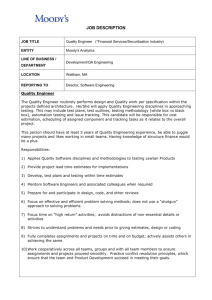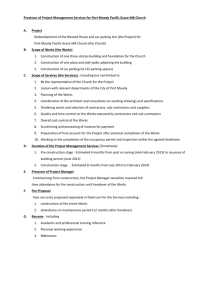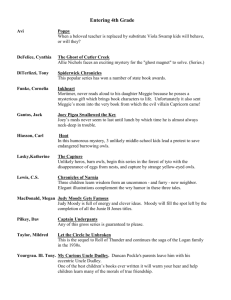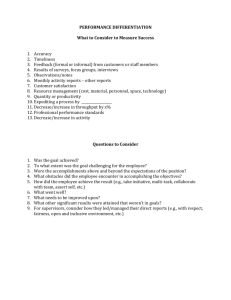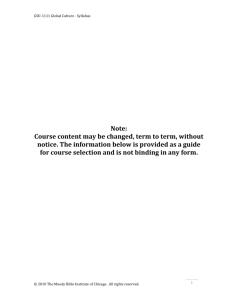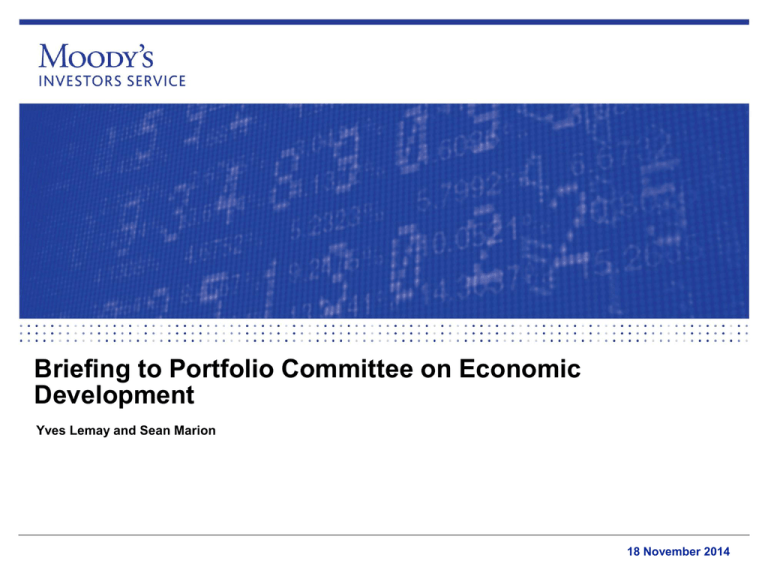
Briefing to Portfolio Committee on Economic
Development
Yves Lemay and Sean Marion
18 November 2014
Agenda
1. Moody’s Credit Rating System
2. Sovereign Credit Ratings
3. Bank Credit Ratings
18 November 2014
2
Moody’s Credit Rating System
18 November 2014
3
About Moody’s
We are one of the World’s Leading Independent Global Provider of Credit Rating Opinions
and Insight on Credit Risk Measurement and Management for over 100 years
» Provide credit ratings and analysis on
– 136,000 corporate, government and structured finance securities
– 10,000 corporate and financial institution relationships
– 100+ sovereign nations
» Extensive credit opinions, deal research and commentary reach
– 5,000 Institutions
– 30,000 client users
18 November 2014
4
Credit Ratings Speak to Credit Risk
» A Moody’s credit rating is an opinion on the relative likelihood of an
issuer to pay its debt
» Moody’s ratings assess Expected Loss
(probability of default) x (severity of loss in case of default)
» Moody’s recognises three types of default events
– Bankruptcy
– Missed interest or principal payment
– Distressed exchange
18 November 2014
5
Role of Rating System
Promote dialogue and debate
» A point of reference easily understood by market professionals
» Market commentary that helps flow of relevant information
» Improve understanding of credit risk, which promotes market integrity and efficiency
18 November 2014
6
Moody’s Symbol System
The rating scale
Moody’s rating system
provide a rank ordering of
relative creditworthiness.
» 6 broad categories; 21 refined
categories,
» Long & Short term ratings
» Further refined by Watchlists
and Outlooks
long term
short term
Aaa
Aa1
Aa2
Aa3
A1
A2
A3
Baa1
Baa2
Baa3
Prime-1
Prime-2
Prime-3
Ba1
Ba2
Ba3
B1
B2
B3
Not Prime
Caa1
Caa2
Caa3
Ca
C
18 November 2014
7
What does Moody’s rate?
Corporate bonds
Syndicated bank loans
Sovereign nations
Municipal obligations
Infrastructure projects
Structured transactions
Bank deposits
Mutual funds
18 November 2014
8
Important Features
To meet market needs, credit rating systems have evolved over time:
Opinions about the future, not statements about the present…
…made available contemporaneously and free of charge to the market,
and
Predictive, stable forecasts of relative credit risk
o Low (absolute) ratings in advance of default
Broad coverage across markets and industries, enables
comparability
18 November 2014
9
Moody’s Investors Service in South Africa
» Assigned 1st time rating to Republic of South Africa – 1994
» Introduced the Moody’s South Africa National Rating Scale – 2001
» Opened local office in Johannesburg – 2003
» Registered by South African Financial Services Board as CRA – May 2014
» Leading coverage among international rating agencies in South Africa
» Includes ratings on:
– Sovereign
– Sub-Sovereign
– Project & Infrastructure Finance
– Corporate Finance
– Financial Institutions
– Structured Finance
18 November 2014
10
Summary of Primary Issuance and Monitoring
Primary Issuance
Initial Rating
Assigned
Public Dissemination
(Press, Website)
Rating
Committee
Monitoring
18 November 2014
11
Summary of Credit Assessment Considerations
QUALITATIVE
ANALYSIS
Management
Strategic Direction
Financial Flexibility
QUANTITATIVE ANALYSIS
Financial Statements
Past Performance
Future Projections
MARKET POSITION
COMPETITIVE TRENDS IN SECTOR
Global / Domestic
REGULATORY ENVIRONMENT
Global / Domestic
SECTORAL (INDUSTRY) ANALYSIS
SOVEREIGN MACRO-ECONOMIC ANALYSIS
18 November 2014
12
Sovereign Credit Ratings
18 November 2014
13
Our Sovereign Portfolio
» Started rating national governments in the 1920s
» Currently rate close to 130 national governments worldwide
» 20 countries rated in Africa
» Assigned first time rating on the debt issued by the Government of South
Africa in 1994
18 November 2014
14
BRICS – Sovereign Ratings
Aaa
Aa3 Stable
Baa2 Stable
Baa2 Negative
Baa2 Negative
Baa3 Stable
Caa3
China
South Africa
Brazil
Russia
India
Source: Moody’s
18 November 2014
15
Moody’s Sovereign Credit Analysis - Framework
18 November 2014
16
South Africa
Stable Rating Outlook – Key Factors
» At Baa2, rating appropriately captures anticipated low growth outlook and public sector
debt trends in the coming years.
» Sheer size of the economic base, wealth levels and natural resources endowment
» Commitment on the part of the government to address key economic challenges
» Structural impediments to growth
» Reigning in the deficit through strict controls on spending
» More financial discipline for state-owned enterprises
18 November 2014
17
Key Drivers for the Rating
1. Constrained Growth Prospects
2. Growing Public Sector Debt
18 November 2014
18
Key Rating Driver – Constrained Growth Prospects
2004-08 avg : 4.9%
6.0
5.0
2010-14F avg : 2.5 %
4.0
3.0
2.0
1.0
0.0
-1.0
-2.0
2004
2005
2006
Source: Haver Analytics, South Africa Reserve Bank, Moody’s
2007
2008
2009
2010
2011
2012
2013
2014F
» Sharp deceleration, far below the growth level needed to lower high unemployment
» Medium Term growth outlook materially constrained by energy shortages, high interest
rate levels and poor investment climate
18 November 2014
19
Key Rating Driver: Growing Public Sector Debt
Gen. Gov. Financial Balance as a % of GDP
» Financial Balance remaining significant
South Africa (Baa1)
Baa Median
2.0
» Compares unfavourably relative to other
Baa-rated countries
1.0
0.0
-1.0
-2.0
-3.0
-4.0
-5.0
-6.0
2004
2005
2006
2007
2008
2009
2010
2011
2012
2013
2014F 2015F
2013
2014F 2015F
Source: Haver Analytics, National Treasury, Moody’s
Gen. Gov. Debt as a % of GDP
» Increasing debt burden due to poor
growth and deficit financing needs
» At 50%, materially higher than peers
South Africa (Baa1)
Baa Median
60.0
50.0
40.0
30.0
20.0
10.0
0.0
2004
2005
2006
2007
2008
2009
2010
2011
2012
Source: Haver Analytics, National Treasury, Moody’s
18 November 2014
20
Market Indicators
18 November 2014
21
Bank Credit Ratings
18 November 2014
22
Moody’s Bank Rating Universe
18 November 2014
23
How a Moody’s Bank Rating is ‘Built’
Standalone
Strength
•Franchise Value
•Risk Positioning
•Operating
Environment
•Regulations
•Financials
Government
Support
•Willingness to
support
•Capacity to
support
Debt &
Deposit
Ratings
18 November 2014
24
Elements in Determining the Standalone Strength
Franchise
Value
Risk
Positioning
• Defensible
franchise
sustains
recurring
earnings
• Controlling
credit,
market and
operational
risk
• Quantitative
(numbers
based)
assessment of
earnings
stability,
diversificati
on, and
market share
• Quantitative
and
qualitative
(comparison
of facts)
assessment of
corporate
governance,
credit risk
concentration
, and
liquidity
management.
Operating
Environment
Why
is it important?
• Economic
landscape
Regulatory
Environment
• Banking
regulatory
oversight
• Qualitative
• Quantitative
How is itof
measured?
assessment of
assessment
regulatory
growth
independence,
dynamics and
credibility,
macro risk
and
enforcement
power
Financial
Fundamental
s
• Financial
performance
• Quantitative
assessment of
profitability
, liquidity,
capital
adequacy,
asset quality
and
efficiency
18 November 2014
25
Government Support
Willingness to
support
Capacity to
support
Track record of
supporting
troubled banks
Sovereign rating
(resources to
bail-out banks)
Public policy
signals on
bailing-out or
bailing-in banks
Size of the
banking sector
relative to
government
resources
18 November 2014
26
Global Distribution of Bank’s Standalone Strength
14%
Average
standalone
strength for South
African banks
12%
11.6%
10.4%
10%
9.0%
8.3%
8.2%
7.8%
8%
7.3%
6.9%
6.6%
6.7%
6%
4.1%
3.9%
4%
2.5%
2.5%
1.8%
2%
1.1%
0%
0.0%
0.0%
0.0%
aaa
aa1
2
aa2
3
1
1.1%
0.1%
aa3
4
a1
5
a26
a37
baa1
8
baa2
9
baa3
10
ba1
11
ba2
12
ba3
13
b1
14
b2
15
b3
16
caa1
17
caa2
18
caa3
19
ca
20
c
21
18 November 2014
27
South Africa and BRICS: Average Bank Ratings
Comparison
Bank Standalone Strength
Parental Support
Government Support
Aaa
Aa1
Aa2
Aa3
A1
A2
A3
Baa1
Baa2
Baa3
Ba1
Ba2
Ba3
B1
B2
B3
Caa1
Caa2
Caa3
Ca
C
South Africa (Baa2)
Brazil (Baa2)
Russia (Baa2)
India (Baa3)
China (Aa3)
Source: Moody’s Investors Service
18 November 2014
28
Yves Lemay
+44.20.7772.5252
Managing Director
yves.lemay@moodys.com
Sean Marion
+44.20.7772.1056
Associate Managing Director
sean.marion@moodys.com
18 November 2014
29
© 2013 Moody’s Corporation and/or its licensors and affiliates (collectively, “MOODY’S”). All rights reserved.
CREDIT RATINGS ISSUED BY MOODY'S INVESTORS SERVICE, INC. (“MIS”) AND ITS AFFILIATES ARE MOODY’S CURRENT OPINIONS OF THE RELATIVE FUTURE CREDIT RISK OF
ENTITIES, CREDIT COMMITMENTS, OR DEBT OR DEBT-LIKE SECURITIES, AND CREDIT RATINGS AND RESEARCH PUBLICATIONS PUBLISHED BY MOODY’S (“MOODY’S
PUBLICATIONS”) MAY INCLUDE MOODY’S CURRENT OPINIONS OF THE RELATIVE FUTURE CREDIT RISK OF ENTITIES, CREDIT COMMITMENTS, OR DEBT OR DEBT-LIKE
SECURITIES. MOODY’S DEFINES CREDIT RISK AS THE RISK THAT AN ENTITY MAY NOT MEET ITS CONTRACTUAL, FINANCIAL OBLIGATIONS AS THEY COME DUE AND ANY
ESTIMATED FINANCIAL LOSS IN THE EVENT OF DEFAULT. CREDIT RATINGS DO NOT ADDRESS ANY OTHER RISK, INCLUDING BUT NOT LIMITED TO: LIQUIDITY RISK, MARKET
VALUE RISK, OR PRICE VOLATILITY. CREDIT RATINGS AND MOODY’S OPINIONS INCLUDED IN MOODY’S PUBLICATIONS ARE NOT STATEMENTS OF CURRENT OR HISTORICAL
FACT. CREDIT RATINGS AND MOODY’S PUBLICATIONS DO NOT CONSTITUTE OR PROVIDE INVESTMENT OR FINANCIAL ADVICE, AND CREDIT RATINGS AND MOODY’S
PUBLICATIONS ARE NOT AND DO NOT PROVIDE RECOMMENDATIONS TO PURCHASE, SELL, OR HOLD PARTICULAR SECURITIES. NEITHER CREDIT RATINGS NOR MOODY’S
PUBLICATIONS COMMENT ON THE SUITABILITY OF AN INVESTMENT FOR ANY PARTICULAR INVESTOR. MOODY’S ISSUES ITS CREDIT RATINGS AND PUBLISHES MOODY’S
PUBLICATIONS WITH THE EXPECTATION AND UNDERSTANDING THAT EACH INVESTOR WILL MAKE ITS OWN STUDY AND EVALUATION OF EACH SECURITY THAT IS UNDER
CONSIDERATION FOR PURCHASE, HOLDING, OR SALE.
ALL INFORMATION CONTAINED HEREIN IS PROTECTED BY LAW, INCLUDING BUT NOT LIMITED TO, COPYRIGHT LAW, AND NONE OF SUCH INFORMATION MAY BE COPIED OR
OTHERWISE REPRODUCED, REPACKAGED, FURTHER TRANSMITTED, TRANSFERRED, DISSEMINATED, REDISTRIBUTED OR RESOLD, OR STORED FOR SUBSEQUENT USE FOR
ANY SUCH PURPOSE, IN WHOLE OR IN PART, IN ANY FORM OR MANNER OR BY ANY MEANS WHATSOEVER, BY ANY PERSON WITHOUT MOODY’S PRIOR WRITTEN CONSENT.
All information contained herein is obtained by MOODY’S from sources believed by it to be accurate and reliable. Because of the possibility of human or mechanical error as well as
other factors, however, all information contained herein is provided “AS IS” without warranty of any kind. MOODY'S adopts all necessary measures so that the information it uses in
assigning a credit rating is of sufficient quality and from sources MOODY'S considers to be reliable including, when appropriate, independent third-party sources. However,
MOODY’S is not an auditor and cannot in every instance independently verify or validate information received in the rating process. Under no circumstances shall MOODY’S have
any liability to any person or entity for (a) any loss or damage in whole or in part caused by, resulting from, or relating to, any error (negligent or otherwise) or other circumstance or
contingency within or outside the control of MOODY’S or any of its directors, officers, employees or agents in connection with the procurement, collection, compilation, analysis,
interpretation, communication, publication or delivery of any such information, or (b) any direct, indirect, special, consequential, compensatory or incidental damages whatsoever
(including without limitation, lost profits), even if MOODY’S is advised in advance of the possibility of such damages, resulting from the use of or inability to use, any such
information. The ratings, financial reporting analysis, projections, and other observations, if any, constituting part of the information contained herein are, and must be construed
solely as, statements of opinion and not statements of fact or recommendations to purchase, sell or hold any securities. Each user of the information contained herein must make
its
own
study
and
evaluation
of
each
security
it
may
consider
purchasing,
holding or selling.
NO WARRANTY, EXPRESS OR IMPLIED, AS TO THE ACCURACY, TIMELINESS, COMPLETENESS, MERCHANTABILITY OR FITNESS FOR ANY PARTICULAR PURPOSE OF ANY
SUCH RATING OR OTHER OPINION OR INFORMATION IS GIVEN OR MADE BY MOODY’S IN ANY FORM OR MANNER WHATSOEVER.
MIS, a wholly-owned credit rating agency subsidiary of Moody’s Corporation (“MCO”), hereby discloses that most issuers of debt securities (including corporate and municipal
bonds, debentures, notes and commercial paper) and preferred stock rated by MIS have, prior to assignment of any rating, agreed to pay to MIS for appraisal and rating services
rendered by it fees ranging from $1,500 to approximately $2,500,000. MCO and MIS also maintain policies and procedures to address the independence of MIS’s ratings and rating
processes. Information regarding certain affiliations that may exist between directors of MCO and rated entities, and between entities who hold ratings from MIS and have also
publicly reported to the SEC an ownership interest in MCO of more than 5%, is posted annually at www.moodys.com under the heading “Shareholder Relations — Corporate
Governance — Director and Shareholder Affiliation Policy.”
For Australia only: Any publication into Australia of this document is pursuant to the Australian Financial Services License of MOODY’S affiliate, Moody’s Investors Service Pty
Limited ABN 61 003 399 657, AFSL 336969 and/or Moody’s Analytics Australia Pty Ltd ABN 94 105 136 972 AFSL 383569 (as applicable). This document is intended to be provided
only to “wholesale clients” within the meaning of section 761G of the Corporations Act 2001. By continuing to access this document from within Australia, you represent to
MOODY’S that you are, or are accessing the document as a representative of, a “wholesale client” and that neither you nor the entity you represent will directly or indirectly
disseminate this document or its contents to “retail clients” within the meaning of section 761G of the Corporations Act 2001. MOODY’S credit rating is an opinion as to the
creditworthiness of a debt obligation of the issuer, not on the equity securities of the issuer or any form of security that is available to retail clients. It would be dangerous for retail
clients to make any investment decision based on MOODY’S credit rating. If in doubt you should contact your financial or other professional adviser.
18 November 2014
30

